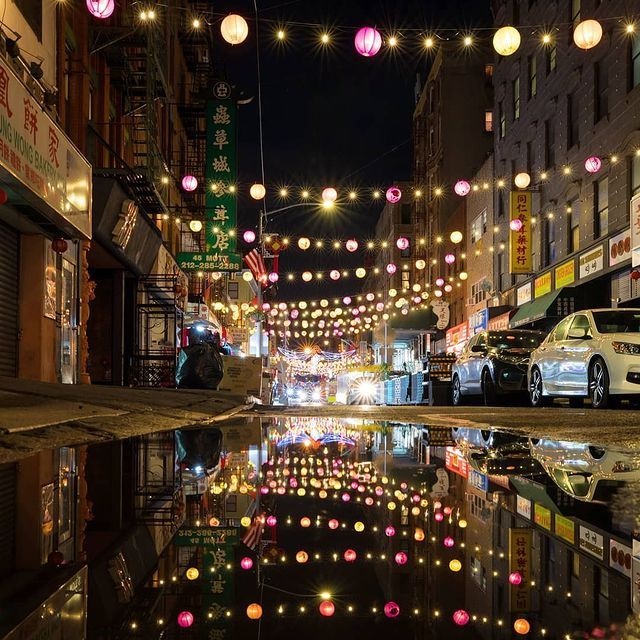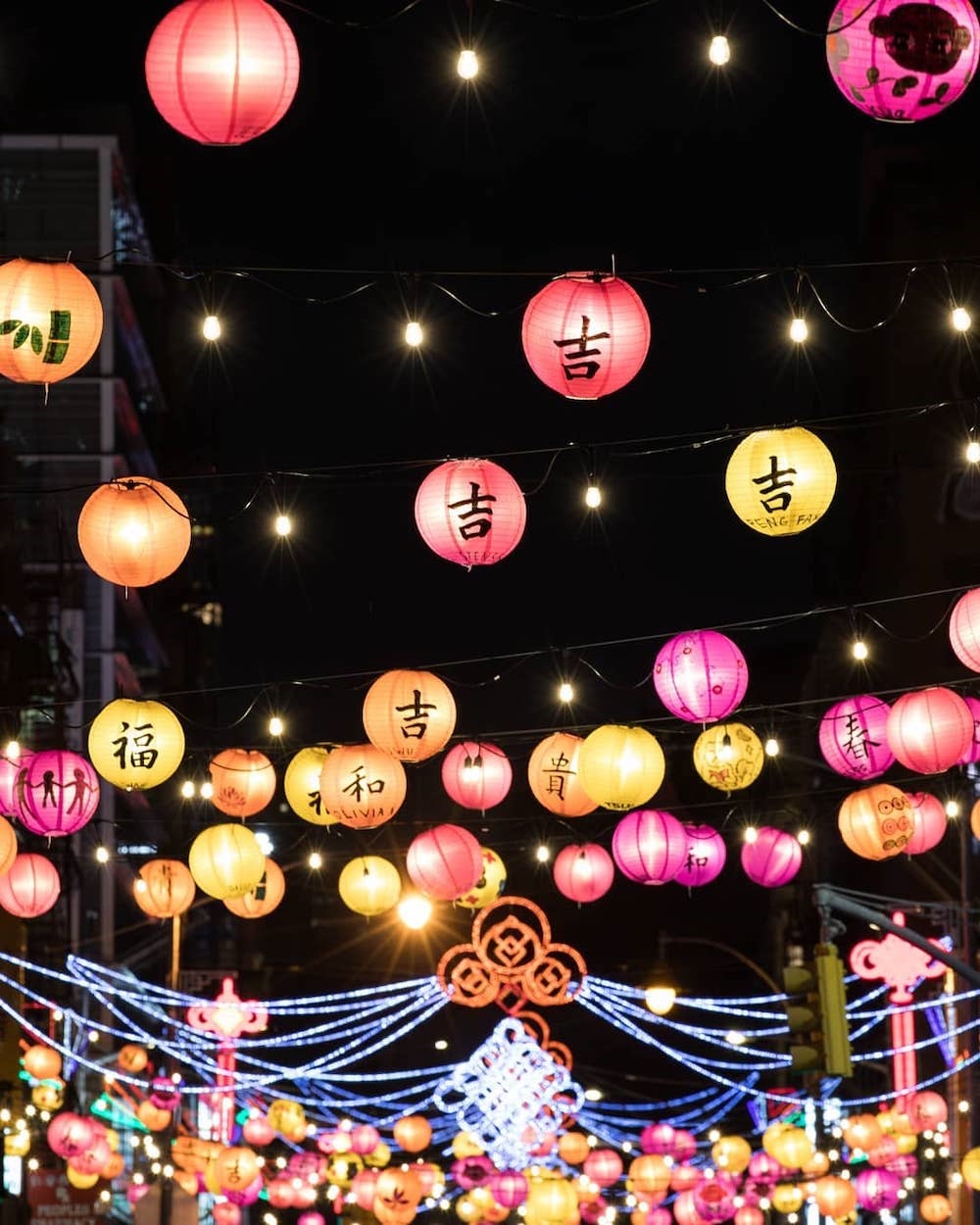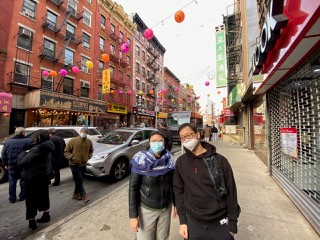Hundreds of lanterns stretch across Chinatown's streets, casting a warm glow. As they multiply across the New York City community, residents hope the lights will bring more visitors and customers to support small businesses and eat at restaurants, even during the cold months.
The lanterns were the idea of Patrick Mock, who saw Chinatown restaurants and small businesses devastated by xenophobia after the coronavirus hit the United States. Some businesses had begun to recover this fall, with takeout food and outside eating. But how do you attract people to the community during the winter?

Storefronts were closed, he says. The streetlight near 46 Mott Bakery, where Mock works as manager, was broken. "Mott Street was pitch black," he says. "I thought: We need more lighting."
The idea lingered in his head. More businesses started to reopen. Mock tried to think of ways to create more foot traffic, he says – to make it look more like a festival. Lighting up Chinatown should be a community project, he thought. And he received help for the project from Asian Americans for Equality (AAFE), a NeighborWorks organization known for community development and for advancing racial, social and economic justice for Asian Americans and other disadvantaged communities. AAFE backed the program with a $10,000 contribution, announced as a surprise to Mock by award-winning actor, producer and rapper Will Smith during Smith's snapchat show "Will from Home."
 Chinatown lights cast a warm glow. Photo by Max Guliani/@maximusupinnyc
Chinatown lights cast a warm glow. Photo by Max Guliani/@maximusupinnyc

"I couldn't stop smiling," Mock says. "Will Smith explaining to the viewers and giving exposure about how Chinatown was hurting meant the world to me."
Ed Litvak, director of marketing and communications for AAFE, says Smith's show reached out to him for their program honoring every-day heroes. They quickly agreed to help. Mock is well known in the community, he says. During the pandemic, he's served free meals of steamed rice, meat, and vegetables to hundreds of homeless and at-risk residents through 46 Mott Bakery.
Ed Litvak, director of marketing and communications for AAFE, says Smith's show reached out to him for their program honoring every-day heroes. They quickly agreed to help. Mock is well known in the community, he says. During the pandemic, he's served free meals of steamed rice, meat, and vegetables to hundreds of homeless and at-risk residents through 46 Mott Bakery.
"Chinatown is obviously really hurting right now, and this grass roots effort is a great way of garnering publicity and luring customers back to the neighborhood," Litvak says. "This project coincided with restaurants having to deal with the effects of a harsh winter. It's going to be a rough period, the next couple of months, when it's not as appealing to be outside, so having a project like this has been very good publicity for the neighborhood. We're happy to support it."
The lights are expected to be a permanent addition to Chinatown. "Our goal is to light up as much of Chinatown as we can to make it look more festive and inviting," Mock says. While business is still down – he estimates his own business is down 60%, because they're doing less wholesale work with restaurants – he has seen an increase in foot traffic, and in the number of people stopping to take photos of the lights. They post photos on Instagram, using words like "magic."
"I knew from the start I wanted it to be a community project," Mock says. "We started bringing one group after another into the project and telling them about the idea. It grew to what it is today."
Loans for businesses
AAFE is also helping businesses through its COVID-19 Emergency Small Business Loan Program, which began when so many businesses began to close. Mock's business received one of those loans in May, he says, from Renaissance Economic Development Corporation, an affiliate program of AAFE. Just as AAFE knew about Mock, Mock knew about them. "Chinatown is small," he says. "We all know each other."

Another emergency loan went to Gary Lin, owner of KyuRamen, who opened a ramen restaurant in Flushing in late September 2019, five months before NYC mandated shelter in place due to the widespread pandemic. "Before COVID-19, people were lining up for lunch and dinner. Then, in March of 2020, after being opened for just five months, the coronavirus spread across the United States. Our business dropped from 100% to 0%. We had a big trouble with cash flow," says Lin.
He went to Renaissance for an emergency loan of $30,000, which allowed him to pay rent and buy inventory. It also gave him time to figure out the new way of doing business – switching to takeout and delivery, adding outdoor dining in August when New York's governor allowed it. Even now, in January 2021, he says, people continue to dine outdoors, though many of the restaurant's orders continue to be carry out.
"We're doing pretty good right now," says Lin. "Sales are almost double from before. People are still coming for their ramen."
Lin says the emergency loan made a difference. Without these emergency funds, he says, "I'm not sure if we would have decided to stay open or to shut down. It made a big change for us." It gave him a chance to catch up on expenses. In fact, Lin is planning to open additional restaurants in New York City and is looking at a new location in Union Square and other locations such as Bayside and New Jersey. Lin's restaurant serves nine types of ramen and the "kyu" in KyuRamen means nine in Japanese. KyuRamen's crowd favorite is the tonkatsu ramen. Lin says that being able to remain open gave him the confidence to move forward with other business plans.
Renaissance's Director of Programs Jannie Lai, mentioned that Renaissance could have provided even more emergency funds had not so many Chinatown businesses already closed permanently. Restaurants and other service-oriented businesses had the hardest time in the target area that Renaissance serves. "We thought this was going to be just three to six months," says Lai. "But it kept going."
As a certified Community Development Financial Institutions (CDFI), Renaissance provides affordable small business loans and technical assistance. Most of the technical assistance comes in the educational seminars that helps immigrant entrepreneurs navigate city and state business rules and regulations. Renaissance also tries to assist people who are unemployed in finding new workforce opportunities. "There is no question that the pandemic has hurt a lot of people," Lai says. "But in time it will pass and the small business community will be reborn." In Chinatown, the new lanterns will light the way.
Further reading: Check out NeighborWorks' community revitalization toolkit and read about the importance of sustainable business in community development.

